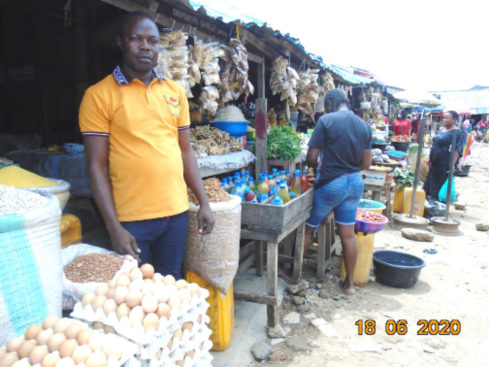Mr. Kingsley Ude never looked back when he decided to go into food business. But how did he make his millions?
Before Mr Kingsley Ude’s crayfish and stock fish trade turned him into a successful merchant, it suffered a period of neglect. Ude started with the humble sum of N6,000 in Kado Fish Market located in Jabi, Abuja.
Today, he is counting millions. But how did this happen? “When I first started this business with just a table under the scotching sun, I would ask myself, for how long will I keep selling crayfish and stock fish in nylon wraps for N20 and N50.
“I was disturbed. “Prior to venturing into crayfish and stock fish business, I entered a five-year agreement to serve my boss who was an importer of motor parts. “The deal was that in the fifth year, he would settle me with a substantial amount of money to start up my own motor parts business.
“Then tragedy happened. “A year before my freedom, my boss sacked 17 boys serving him, including myself. “He did that because during a major business transaction in Japan, he was defrauded. “I had to start life from scratch when all hope was lost. However, with the little I saved, I purchased a motorcycle and started to transport passengers. “I made a profit of N6000 and used it as capital to start my business in 1999.
“I bought a milling machine at N1200, a bag of garri for N300, a bag of long grain rice for N1700, a bag of short-grain rice N1700, measuring plates of different sizes, and I constructed a wooden table.” From selling off a table under the scorching sun in Kado Fish Market, Ude moved under a shade and then into a shop when the market was built. “At that time, money had more value. With that little amount, I was able to start up.
“Now that amount will be valueless. “Then, the exchange rate was about N67. Even when things got worse, I strived to remain in business,” he said. Heads of stockfish displayed at Mr Ude’s shop in Kado “Stockfish business is so lucrative that every part of the fish is sold separately at different costs. “A bag filled with only heads of stock fish is sold at N85,000 while one with only bones of stock fish goes for N75,000.
“The cost of 2kg of deboned is N18,500 each, and a bag of the fleshed called cod costs N480,000. “I was able to send all my younger ones to school; in fact, this business helped me sponsor one of my younger brothers to Germany. “I was able to afford a car, built my house and got married. “Today, I train my children and take care of my family comfortably from this business. “What else do I need in life?” While describing how the pandemic has affected his business, Mr Ude said both purchase and selling price has skyrocketed. “Lots of my customers no longer have purchasing power.
“Having built a customer relationship over the years, I have Identified my real customers and assist them until they can afford to pay. “A single head of stockfish once sold at N500 now costs N800. “Also, a bag of crayfish, formerly N65,000 is now N90,000, while a boned bag of stock fish that used to be worth N43,000, now costs N75,000. “A bag that contains only the heads previously N62,000 is currently N85,000. “When I started, a bag of stockfish was between N700 to N1000. “People didn’t even buy the bones or head, but now those rejected parts are sought after because people are looking for what they can afford.”
A cross section of food items on display Two weeks ago, Mr Ude ordered and paid for over ten bags of stockfish from Aba and his goods are yet to arrive Abuja. He attributed the delay to the interstate lockdown and said when lockdown is completely relaxed, it would mark an end to the outrageous extortions on the highway and the cost of transporting goods will be back to normal. This will make the selling price fair enough for every buyer. Another trader, Nancy Chukwumba, who learned under her mother in 2007 added that her mother has been into foodstuff business before she was born 25 years ago. Mrs. Janet Chukumba, Nancy’s mother, started her business by selling fufu, also known as akpu and farmed cassava at the back of Gwarimpa secondary school. During harvest time, the cassava is harvested and processed into fufu.
Nancy said her mother gradually grew her business over the years and today, the business has expanded to the point where they occupy a strategic location in the market.
“We make sales every day although we as sellers order for our goods blindly because they are perishable and can get damaged on the highway before it gets to us. “We purchase fresh leaves like uziza and uha from the east, while palm fronds and periwinkle are from the south. Before the lockdown, a bag of garri cost N9000, now a bag of garri sells at N19 000.”
Source: Dailytrustng




